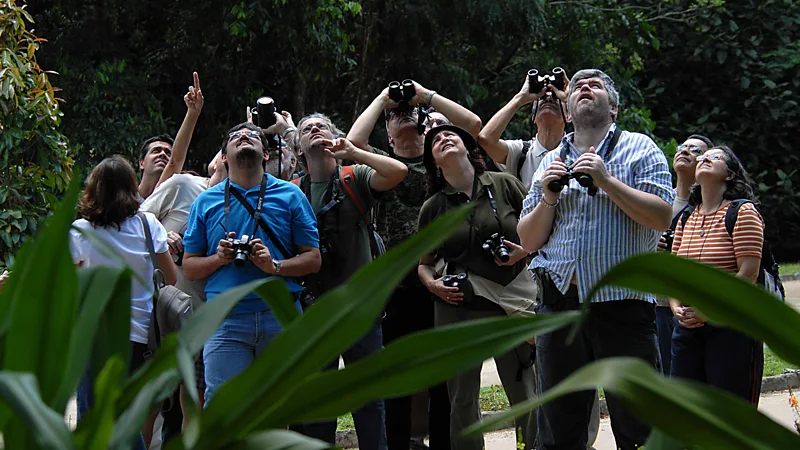Tech
Bat-watching, beach explorations and ‘sniff’ walks: How nature can provide a tonic for loneliness

There is an ever-growing list of the benefits of natural prescriptions – now researchers say nature could offer a cure for loneliness too.
Kye Aziz didn’t consider himself a big nature lover. As an asylum-seeker originally from Indonesia, now based in Melbourne, he’d spent stints of time in the outback and high country. But it wasn’t until a socially-prescribed picnic and gardening excursion that he began to see nature in a new way.
“You feel like you’re transported somewhere else,” says Aziz. “Living in Australia and in Western culture can be very lonely and individualistic – but when we’re sitting outside and having a laugh and feeling that togetherness, it just feels like home.”
There’s a science to that feeling. In the 1980s, in a public health bid to help stressed urban workers heal through nature, the Japanese government invested in a campaign for “shinrinyoku”, or forest bathing. At first, “it was a feeling, not a science” says Qing Li, a medical doctor and clinical professor at Nippon University in Tokyo. But in recent decades, Li and other researchers have linked forest bathing to lower blood pressure, a stabilised nervous system, fewer stress hormones, boosted immune function, and reduced anxiety, depression, anger and fatigue.
According to the late naturalist, Edward Wilson, these health benefits are a product of “biophilia” – an innate love of nature that underpins our near-universal tendency to interact with plants, animals, and other humans.
Tech
Ukraine ends transit of Russian gas to EU

Russian gas supplies to EU states via Ukraine have ended after a five-year deal between Ukraine’s gas transit operator Naftogaz and Russia’s Gazprom expired.
Ukrainian President Volodymyr Zelensky said earlier that his country would not allow Russia to “earn additional billions on our blood” and had given the EU a year to prepare.
The European Commission said the continent’s gas system was “resilient and flexible” and that it had sufficient capacity to cope with the end of transit via Ukraine.
Russia can still send gas to Hungary, as well as
Tech
Do not wipe toilet seat with toilet paper: Japanese maker

Japanese toilets – equipped with music players, automatic flushes, and heated seats – are clearly not afraid of making a splash with their innovative designs.
But these cutting edge seats have an unlikely nemesis: toilet paper.
Toto, a top Japanese toilet bowl maker, said last week that users should refrain from wiping their seats with toilet paper, as it risks creating micro scratches on the surface.
The company’s advice came after a series of posts on social media complaining about scratches and discolouration.
Tech
Future of space travel: Could robots really replace human astronauts?

On Christmas Eve, an autonomous spacecraft flew past the Sun, closer than any human-made object before it. Swooping through the atmosphere, Nasa’s Parker Solar Probe was on a mission to discover more about the Sun, including how it affects space weather on Earth.
This was a landmark moment for humanity – but one without any human directly involved, as the spacecraft carried out its pre-programmed tasks by itself as it flew past the sun, with no communication with Earth at all.
Robotic probes have been sent across the solar system for the last six decades, reaching destinations impossible for humans. During its 10-day flyby, the Parker Solar Probe experienced temperatures of 1000C.
But the success of these autonomous spacecraft – coupled with the rise of new advanced artificial intelligence – raises the question of what role humans might play in future space exploration.
-

 Entertainment5 months ago
Entertainment5 months agoEarthquake scientists are learning warning signs of ‘The Big One.’ When should they tell the public?
-

 International5 months ago
International5 months agoTarar accuses Imran Khan of conspiring with Faiz Hameed to destabilise Pakistan
-

 International2 months ago
International2 months agoPTI Announces Not to Boycott New Committees
-

 Business3 months ago
Business3 months agoMajor Corruption Scandal Uncovered at WASA Multan: Rs1.5 Billion Embezzlement Exposed
-

 Business4 months ago
Business4 months agoThe Impact of QR Codes on Traditional Advertising
-

 Business4 months ago
Business4 months agoThe Benefits and Problems of International Trade in the Context of Global Crisis
-

 Business4 months ago
Business4 months agoFraud by Pakistani Firm Sparks Outrage in Business Community; Concerns Rise Over International Investment
-

 Business2 months ago
Business2 months agoHigh Court Blocks MDCAT Merit List Amid Controversy Over Exam Error






